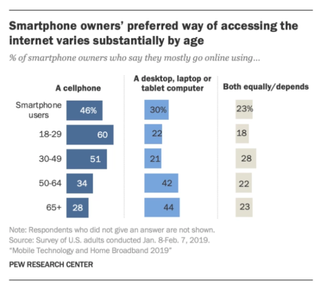Pew: Mobile Broadband Users Double Since 2013

The percentage of respondents who said their primary online access devices is mobile has effectively doubled since 2013, and many of those are using mobile as a substitute, rather than a complement, to wired broadband service.
That is according to a new Pew Research Center study, which found that 37% us their smartphone to go online, compared with 19% in 2013.

The trend is driven by younger demos, with a majority (58%) of those 18-29 says the mostly go online using their phone. But the 30-49 demo is not far behind at 47%, which, again, is essentially double 2013's 24%.
And among the 27% of respondents who said they don't have a fixed broadband connection, 45% say that is because their mobile device fills the broadband bill. According to the study, "the share of non-broadband users who say their smartphone is the most important reason for not having a high-speed internet connection where they live has nearly doubled over the same time period, from 12% to 23%."
At the same time, affordability is not as big a factor in not having a home fixed broadband connection. The study found that the percentage of people who cited cost as the reason dropped from 33% to 21%.
But 80% of those who do not now have a home fixed broadband connection say they are not interested in getting one.
The study was based on interviews conducted Jan. 8 to Feb. 7, 2019, among 1,502 U.S.adults 18-plus. The margin of error is plus or minus 2.85 percentage points.
Broadcasting & Cable Newsletter
The smarter way to stay on top of broadcasting and cable industry. Sign up below
Contributing editor John Eggerton has been an editor and/or writer on media regulation, legislation and policy for over four decades, including covering the FCC, FTC, Congress, the major media trade associations, and the federal courts. In addition to Multichannel News and Broadcasting + Cable, his work has appeared in Radio World, TV Technology, TV Fax, This Week in Consumer Electronics, Variety and the Encyclopedia Britannica.

